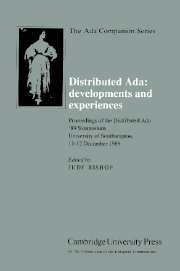 Distributed Ada: Developments and Experiences
Distributed Ada: Developments and Experiences Published online by Cambridge University Press: 13 October 2009
Although Ada is now reaching its adolescence, distributed Ada is still in its infancy. The extent of the problems yet to be solved and the multitude of proposed solutions presents a very real dilemma for prospective implementors and users alike. How does one specify a distributed program? What parts of Ada are allowed to be distributed? Will the underlying hardware configuration matter? Can the program be made fault tolerant and reliable in the face of processor failure? How much effort will it take to move an existing Ada program onto a mutiprocessor system? Will the proposed new Ada Standard (Ada 9X) address distributed issues?
These are just some of the questions that arise, and there is considerable effort being expended, world-wide, in answering them. However, much of this work is being conducted in small working groups, and the interim results are published only in condensed form, if at all. The aim of this book is to open the debate to as wide an audience as possible, heightening the level of awareness of the progress that has been made to date, and the issues that still remain open.
The symposium on which this book is based was held at the University of Southampton on 11–12 December 1989 and attended by nearly 100 people.
To save this book to your Kindle, first ensure [email protected] is added to your Approved Personal Document E-mail List under your Personal Document Settings on the Manage Your Content and Devices page of your Amazon account. Then enter the ‘name’ part of your Kindle email address below. Find out more about saving to your Kindle.
Note you can select to save to either the @free.kindle.com or @kindle.com variations. ‘@free.kindle.com’ emails are free but can only be saved to your device when it is connected to wi-fi. ‘@kindle.com’ emails can be delivered even when you are not connected to wi-fi, but note that service fees apply.
Find out more about the Kindle Personal Document Service.
To save content items to your account, please confirm that you agree to abide by our usage policies. If this is the first time you use this feature, you will be asked to authorise Cambridge Core to connect with your account. Find out more about saving content to Dropbox.
To save content items to your account, please confirm that you agree to abide by our usage policies. If this is the first time you use this feature, you will be asked to authorise Cambridge Core to connect with your account. Find out more about saving content to Google Drive.